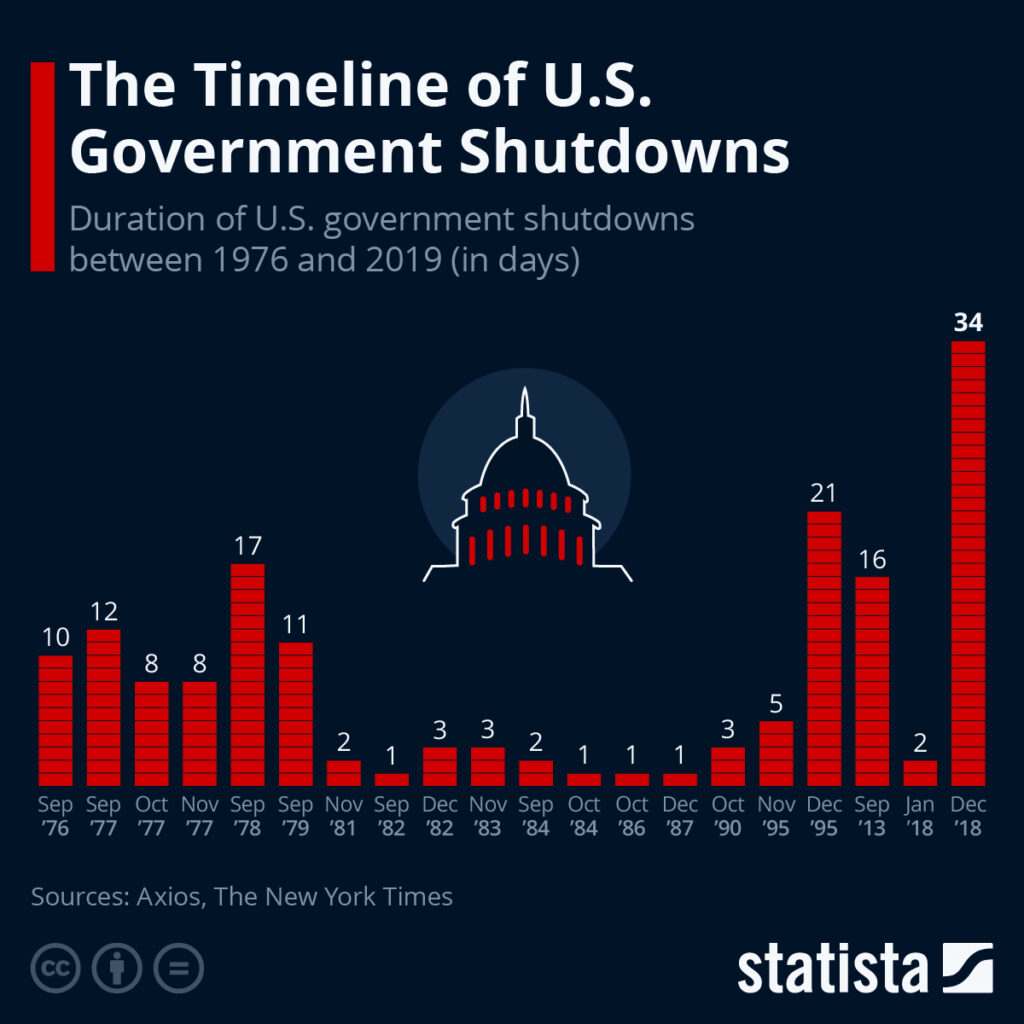Welcome to the September 29, 2023 issue of Cotton News, a service provided by Plains Cotton Growers Inc. for the cotton industry in the Texas High Plains and beyond.
What Does A Government Shutdown Mean for Farmers?
University of Arkansas Agriculture Division Extension Economist Ryan Loy’s Take in Southern Ag Today
As we approach the end of the U.S. government’s (USG) fiscal year, the probability of a government shutdown seems imminent. The USG has until tomorrow (September 30th) to reconcile differences in government spending before they ultimately shut down for an unknown period (Cassella, 2023). The issues arise in Congress where disagreements on government spending based on ideological lines have paralyzed the passing of funding bills needed to keep the government running beyond September 30, 2023. To avoid a government shutdown, Congress has several tools at its disposal, ranging from passing a short-term Continuing Resolution to passing all 12 appropriations bills (e.g., funding allocations for government agencies). Keep in mind that President Biden must also sign whatever Congress passes by the end of day on September 30th (Committee for a Responsible Federal Budget, 2023). Otherwise, a shutdown is nearly impossible to avoid. Incidentally, the 2018 Farm Bill also expires tomorrow. While we touch on that below, farm bill reauthorization is currently taking a backseat to efforts to fund the government.

What does a shutdown mean for farmers?
Besides a shutdown impacting everything from social security, national parks, and air travel, the agricultural sector may also be heavily affected. Namely, the Farm Service Agency (FSA), Natural Resources Conservation Service (NRCS) and Rural Development offices are expected to close (Bickelhaupt, 2023). For a producer who participates in government programs, these agencies likely will not hold sign-ups, accept acreage reports, or issue participation payments during this time. While the length of a government shutdown would ultimately determine the overall impact to the farm sector, folks expecting payments for participation and/or wanting to enroll in a new program will likely feel the impacts shortly after the shutdown.
What about farm bill expiration?
Importantly, the prospect of a government shutdown and the expiration of the farm bill are two separate issues – they just happen to be occurring at the same time. However, the difficulty incurred in avoiding a government shutdown further highlights the challenges Congress faces in reauthorizing the farm bill. For producers, the impact of an expiring farm bill would likely not be felt until early 2024, because the current programs like Price Loss Coverage (PLC) and Agriculture Risk Coverage (ARC) run through the end of this calendar year (Zimmerman, 2023). If farm bill expiration were to stretch into the New Year, USDA would need to pay out commodity price supports as laid out in the 1938 and 1949 Farm Bills; meaning, the USDA would be forced to purchase commodities such as milk, wheat, and cotton, at “parity prices” that are on par (in terms of purchasing power) with levels in the early 1900s (e.g., $50.70/hundredweight for milk based on May 2023 data). These price supports could mean that the U.S. government would “outbid” commercial markets and ultimately raise the price of retail commodities (Congressional Research Service, 2023). With respect to farm bill expiration alone, government programs such as SNAP (Supplemental Nutrition Assistance Program) and crop insurance would likely not feel the same impacts. SNAP is an appropriated entitlement, and Congress likely would continue funding SNAP via the appropriations process (although we discussed above how that process has unfolded this year) and thus could continue most programs. Crop insurance is permanently authorized and funded by the Federal Crop Insurance Act that does not expire with the 2018 Farm Bill (Congressional Research Service, 2023).

TCGA Conducts Safety Seminars for 2023 Harvest Season
Originally published in the TCGA newsletter “The Ginnery.” Written By Aaron Nelsen.
The last of our 2023 safety seminars were completed on September 21 with the last meeting taking place in Lubbock. Our final seminar produced a large crowd of around 140 participants in our general sessions. Two general sessions are conducted at each seminar. We deliver an English session in the morning and the Spanish session is conducted in the afternoon. We conduct a manager session as well in the afternoon. There are plenty of moving parts at each meeting. We are fortunate to partner with Texas Cotton Ginners’ Trust to provide this training for cotton gins. TCGT sponsors the meetings each year. They provide the meals, the seminar manuals and the manpower. Nearly all training is provided by TCGT staff. The TCGT loss control team is the right group to deliver the message. They are in cotton gins every day. They are familiar with what is happening inside the gin and always assisting ginners in developing a plan to keep workers safe. We are proud to partner with TCGT to provide this training for cotton gins each year.
Over the years, TCGT has worked with gin employees to create testimonials to help deliver the safety message. New testimonials have been produced over the last couple of years by TCGT. Accidents and the injuries that result from them can be very emotional subject matter for gin employees. Having these employees speak in front of a camera can be challenging as well. Talking about accidents is not easy and you can sense that when you watch the testimonials. We certainly appreciate all the work that is done to put these testimonials together. Close relationships between the TCGT loss control team and the gin employees make the testimonials possible. There is a level of trust that has been established between the loss control team and gin personnel. Nobody likes talking about making a mistake; that is hard to do. However, if others can learn from past incidences and possibly prevent someone from repeating the same type of mistake, the people involved in the accident become willing to talk about them. They do it for the greater good. The ginning community is a tight-knit family. They look out for one another. There are 168 hours in a week. During a typical ginning season, these employees spend 84 hours of their week working at the gin. Essentially, they are spending half of their life with their fellow gin members while they process a cotton crop. You can probably equate a gin team to a sports team. Each year, the gin team looks a little different. Injuries can make or break a season for a sports team. It is no different for a cotton gin. Employees need to look out for one another. It all starts with training. If gin employees are not trained to work safely, you are going to be fortunate not to have an accident. That is not to say a gin employee cannot be hurt even with training, but by providing proper training, you are reducing the risk of accidents. It simply equates to loss control. Training is the key. That is what the safety seminars are all about.
Let’s recognize the people responsible for making the seminars happen each year. Texas Cotton Ginners’ Trust (TCGT) is the sole sponsor of the seminars as mentioned earlier in the article. The goal is to keep our workplaces safe for our employees as they are the lifeblood of the industry.
The TCGT loss control team consists of James Shepard, Luis Garcia, Wally Davis, Jerry Multer and David Urbina. These team members develop the training material each year and present the material as well. For many years now, employees from member gins have assisted in our Spanish presentations and these team members are invaluable as we strive to exchange information with as many gin workers as possible. These team members have really taken ownership in safety and are greatly assisting the effort to make all Texas gins a safer workplace. This kind of work can be extremely rewarding when you see gin employees buy into the message being delivered. One seminar will not do that, but it certainly helps. Consistent and proper training is the key. Let’s recognize members of the TCGT loss control team and ginners from member organizations who assisted with the Spanish presentations:
- Weslaco – Luis Garcia(TCGT) and David Urbina (TCGT)
- Corpus Christi – Luis Garcia (TCGT), David Urbina (TCGT) and Hector Cruz (Edcot Co-op Gin)
- El Campo – Luis Garcia (TCGT), David Urbina (TCGT) and Jesus Cruz (Edcot Co-op Gin)
- Waco – Luis Garcia (TCGT), Marcial Saenz (Central Rolling Plains Co-op) and Albert Leyva (Citizens Shallowater Co-op Gin)
- Sweetwater – Luis Garcia (TCGT), David Urbina (TCGT) and Marcial Saenz (Central Rolling Plains Co-op)
- Lubbock (August 2) – Luis Garcia (TCGT), David Urbina (TCGT) and Leandro Ramirez (Associated Cotton Growers)
- Canyon – Luis Garcia (TCGT), David Urbina (TCGT) and Leandro Ramirez (Associated Cotton Growers)
- Childress – Luis Garcia (TCGT), David Urbina (TCGT) and Leandro Ramirez (Associated Cotton Growers)
- Lubbock (September 21) – Luis Garcia (TCGT), David Urbina (TCGT) and Johnny Najera (Meadow Farmers Co-op Gin)
The men helping Luis and David are ginners by trade, not professional speakers. Their willingness to speak about safety to large groups of their peers is commendable and very much appreciated. We continue to learn the training goes both ways as we all learn from each other. The instructors bring the safety message to the classroom, but all participants benefit from the discussion and interaction that takes place during each session. Successful safety programs begin with good communication and a good attitude. Make safety a priority and be sure your employees are engaged in creating a safe workplace for everyone. Be sure you have someone leading your safety effort. TCGT has programs available to help train the person who is providing your training. TCGT members should be taking advantage of that service.

We had 563 participants attend a general session. This does not include manager session attendees. There is a tremendous amount of time and resources invested in these meetings each year. We very much appreciate everyone who took time out of their busy schedule to attend.
Remember, if you are a member of Texas Cotton Ginners’ Trust, attending a seminar is one of the requirements to receive the safety credit they are offering on your 2023/24 premium. Hopefully, the nine sessions plus the district meeting sessions gave ample opportunity for everyone to attend. We did reduce the number of seminars by two this year. We had one less meeting in Lubbock and combined the Pampa and Tulia meetings into one meeting in Canyon. The feedback seemed good. If you have an opinion on that you would like to share, please contact Aaron Nelsen.
Attendance certificates will be mailed in the next couple of weeks along with a printout for your records showing all employees who attended a general session. If you have corrections that need to be made, contact the TCGA office and we will be glad to assist you. Please note that certificates will be printed for only those who signed in for the general session. Certificates are not printed for the manager session participants. Weslaco, Corpus Christi, El Campo and Waco certificates were mailed earlier in the summer.
Remember to visit the safety section of the TCGA website at www.tcga.org. There are tools available to help you with your safety program on the website. Remember, the NCGA safety videos are available there. If you prefer thumb drives or DVD’s, we can have those available as well!
Be safe and look out for one another and let us know if we can help.